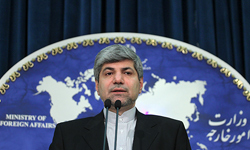
Iran once again said that it opposes foreign meddling in Syria’s internal affairs and supports any plan which seeks a political solution to the current standoff in the Muslim country.
Reacting to a recent Security Council statement on Syria which was adopted on Wednesday, Iranian Foreign Ministry Spokesman Ramin Mehman-Parast noted on Thursday that the crisis in Syria should be solved through a political solution away from hastiness and foreign intervention.
“The Islamic Republic of Iran will agree to any initiative which will guarantee the Syrian nation’s demands, facilitate reforms announced by the Syrian President (Bashar al-Assad)…, lead to stability and peace in the country, and pave the way for a national dialogue,” Mehman-Parast stressed.
The remarks by the Iranian spokesman came after the United Nations Security Council extended its support for the six-point peace plan proposed by the UN-Arab League envoy, Kofi Annan, for a UN-supervised halt to the current fighting in Syria.
In a statement on Wednesday, the council called on the Syrian government to “immediately” carry out the peace plan proposed by Annan.
Annan’s six-point plan calls for a UN-supervised halt to fighting, a daily two-hour humanitarian pause to hostilities, withdrawal of government troops and heavy weapons from crisis-hit cities and access to all areas affected by the fighting.
Annan will return to Syria soon for further talks with Syrian officials.
During his last visit earlier this month, the former UN chief called for a peaceful solution to end the year-long unrest in the country.
The Syrian president has said that he is ready for any honest effort to resolve the situation in the country.
Syria has been experiencing unrest since mid-March with organized attacks by U.S-backed well-armed gangs against Syrian police forces and border guards being reported across the country.
Hundreds of people, including members of the security forces, have been killed, when some protest rallies turned into armed clashes.
The government blames outlaws, saboteurs, and armed terrorist groups for the deaths, stressing that the unrest is being orchestrated from abroad.
In October, calm was eventually restored in the Arab state after President Assad started a reform initiative in the country, but Israel, the US and its Arab allies are seeking hard to bring the country into chaos through any possible means. Tel Aviv, Washington and some Arab capitals have been staging various plots in the hope of stirring unrests in Syria once again.
This is while Assad has done a lot in recent months to reform laws and conditions in his country. The Syrian president announced the end to the state of emergency, granted citizenship to many Syrian Kurds and promised parliamentary elections later this year. In January, he issued the latest of thousands of amnesties for those detained since the uprising began.
Syria also in February held a referendum on the country’s new constitution. More than 14 million Syrians over 18 could vote and almost 90 percent of the voters approved a new constitution in the referendum.
Under the new charter, freedom is ‘a sacred right’ and ‘the people will govern the people’ in a multi-party democratic system based on Islamic law.
The document allows multiple political parties to compete in elections for the legislature, sets a limit of two seven-year terms on the president, and eliminates a clause that guarantees political supremacy to Assad’s Ba’ath Party.







